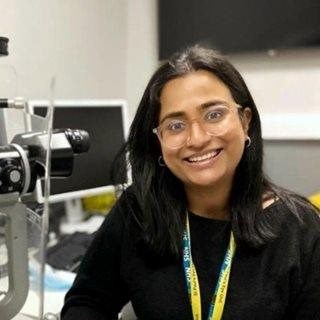You can now join your professional body!
A career in optometry is varied, interesting and fulfilling, but the first weeks and months in practice can be daunting. Don’t worry; you are not alone. The College is your professional body, and we're here to help!
As a College member we'll provide you with clinical and professional information, learning support and resources that will boost your confidence and build your skills and knowledge. We’re also raising the profile of optometry and eye health care and making the case for a greater role for optometrists in primary and secondary eye care – ensuring that your knowledge and skills are recognised, and you can fulfil your potential as you progress in your career.
Join now for under £6 a month!
Enjoy the benefits of College membership
Clinical advice
Our in-house clinical advisers are just a phone call or message away to provide a prompt answer to your clinical, professional and ethical questions. Save their details in your phone now.
Online CPD
Earn those vital CPD points with our online courses and resources. Our online CPD will boost your confidence and help to develop your skills and knowledge in a variety of areas. Get ahead and start earning your points.
Patient information
Our popular patient information leaflets are completely free of charge to members, and are designed to help patients understand common conditions. Stock up on yours today.
Clinical information
Our Clinical Management Guidelines (CMGs) are a reliable source of evidence-based information on the diagnosis and management of a range of conditions. Keep up-to-date.
MCOptom
Our affix is a sign of member commitment to the highest standards of eye care. Join our community and add MCOptom to your name.
Member app
Our clinical member-only app provides guidance and information on the go, even when you're offline. Download now.
Plus…
- Get your hardcopy of #AcuityJournal - the College's inspirational and informative professional development journal for members.
- Try out our case studies and ethical scenarios, testing your knowledge and giving you access to quality case studies for your own peer discussion or peer review.
- Use your OpenAthens password for free online access to the world’s leading optometric and ophthalmic journals.
- Keep up-to-date with Ophthalmic and Physiological Optics (OPO) - the College’s optometry and vision science journal, OPO, top-ranked in the world.
Starting out as a newly qualified optometrist

Rupa Patel MCOptom

NHS hospital optometrist
‘My first job as a qualified optometrist was in a busy hospital optometry department – so to say I felt out of my depth would be an understatement! But my new colleagues were patient and very supportive, and I soon realised that I knew more than I thought I did. The Scheme for Registration and my supervisors not only helped me to develop my clinical abilities, but also taught me how to communicate, how to juggle studying with working, and also how to keep calm in stressful situations.
‘I think the biggest challenge was remembering that I no longer had a supervisor! As a pre-reg, it was easy to feel a little complacent knowing you supervisor would advise you after every patient encounter, but once you qualify the decision-making is all on you. I think you can often feel alone when you first qualify, and so being a member of an organisation like the College can help you feel like you have people on your side, should you need professional advice and guidance. I think we can also learn a lot from attending lectures and CPD events.’

Natasha Richards MCOptom

Optometrist for a multiple practice
‘You learn a lot during pre-reg, but it can be difficult to see how everything fits together. The College website is the most useful tool for differential diagnosis, signs and symptoms, and referral guidelines. I learned how to do lacrimal syringing at Optometry Tomorrow, which has been very useful in practice – and enjoyable! Now, I can save my patient a long wait for a hospital appointment.
'After each day, think about the patients you’ve seen and where you struggled, and then focus on those areas and practise, practise, practise! For example, if you saw a macular hole for the first time and had difficulty explaining it to the patient, explain macular holes to family and friends. If you felt your knowledge on how to refer CSR wasn’t good enough, research it that evening. Next time you encounter these situations, you’ll be confident in your abilities.
'We learn everything in optometry terms, but being able to relay that information in a clear way to patients without overwhelming or scaring them can be difficult. I‘ve found the College’s case scenarios on topics like how to explain various pathologies to patients really helpful, and the patient leaflets are useful too.'

Alex Thornton MCOptom

Working in independent practice
‘My advice to newly qualified optometrists would be to believe in yourself. I know it sounds cheesy but you’ve qualified for a reason. You know your stuff or you wouldn’t have got this far!
‘Losing the safety blanket of checking everything with your supervisor throws you in at the deep end. The Scheme for Registration is fantastically designed to enable you to apply the knowledge you have developed through university and, although I did feel like I was ready to ‘go solo’, the biggest challenge for me was developing the confidence in my clinical ability to treat patients. One thing I struggled with once qualified was bringing my testing time down and I found this came with practice and routine, something that can only really be achieved with a regular clinic.
‘My university notes were an absolute life saver during my pre-reg training. But since qualifying, I have discovered other methods of learning. The College Clinical Management Guidelines and Optometrists’ Formulary are fantastic resources. I still use them almost daily now! I was also very lucky to have experienced colleagues who are always happy to answer my questions.
‘My best experience of the first few weeks in work? Signing my first prescription! I’d been working since I was 18 to get to this point - so it was a big moment. Also being able to tell the patient that I was one of the optometrists on the team as opposed to a pre-reg optometrist.’